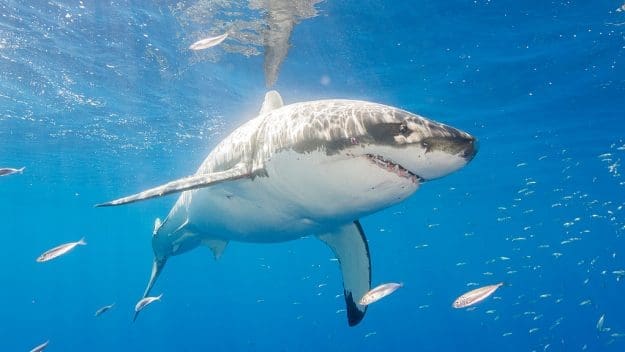Panic is spreading across the US east coast, with increasing reports of Great White Shark sightings across various beaches.
Consequently there have been at least 59 beach closures between July and the first week of August in Cape Cod and Islands, southeastern Massachusetts. According to The Boston Globe, there were 42 beach closures occurring in the first week of August alone.

One resident, AJ Salerno, told the Wall Street Journal, that he had banned his son from surfing and was considering moving areas.
He said:
“We’ve been bullied out of the water by the sharks,”
A Massachusetts state researcher, who tags great whites, said this has been his busiest July ever and authorities have put up warning signs on beaches, reading: “People have been seriously injured and killed by white sharks along this coastline,”
SHARK TRACKED: Drone footage shot off the coast of Chatham, Massachusetts, shows a boat tracking an adult great white shark swimming near the surface; shark sightings near shore have led to several Cape Cod beach closures this summer. https://t.co/EhZj6wiMuD pic.twitter.com/fjAhpFRbxo
— World News Tonight (@ABCWorldNews) August 13, 2019
26-year-old Arthur Medici died last year after being bitten by a shark while body-boarding. This was the first shark related fatality in Massachusetts since 1936.
As reported by The Independent, Joe Booth, a local fisherman and surfer, saw the incident unfold:
I was that guy on the beach screaming, ‘Shark, shark!’ It was like right out of that movie Jaws. This has turned into Amity Island real quick out here.
Footage circulated online this week showing a 17ft great white shark swimming around a family’s boat just off Cape Cod Bay.
This family had a close encounter with a great white shark when it swam underneath their boat near Provincetown, Massachusetts https://t.co/j2DyuT7Lvp pic.twitter.com/41NHY028ky
— CNN International (@cnni) August 18, 2019
Just a day later, the Atlantic White Shark Conservancy (AWSC), a non-profit that aims is to raise awareness and survey great white shark numbers in and around Cape Cod, posted a video online showing sea water turning red after a shark attacked a seal.
According to the WWF, great white shark numbers are decreasing globally, and they have been listed as a ‘vulnerable’ species. They face many threats such as over-fishing for shark fin soup.
Despite this, the animals have been flocking to Cape Cod in growing numbers and the cape is now the only known place in the northwest Atlantic where white sharks aggregate, according to AWSC.
Researchers believe the US 1972 Marine Mammal Protection Act, which banned catching marine mammals including seals, whales and dolphins could be the driving force behind the rise in shark numbers. This protection has allowed seal populations to thrive in and around Cape Cod, and of course it goes without saying, more food = more sharks.

Sensationalized media and storytelling in infamous movies like: “Jaws” or “The Meg” have given sharks a pretty bad wrap. They’re seen by many to be mindless killers that actively prey on humans, which is of course untrue.
The WWF explains:
Humans are not food for sharks. The sharks involved in incidents with humans are often hunting for similar-sized prey to humans, such as seals or dolphins… you are more likely to be struck by lightning than attacked by a shark.
There have been a reported 314 unprovoked great white shark attacks around the world, with 80 of those being fatal. With odds like those, no one would blame you for rather sticking to the sand on your next trip to the beach!
Two weeks ago, 2 people were attacked by sharks just minutes apart on a Florida beach!
